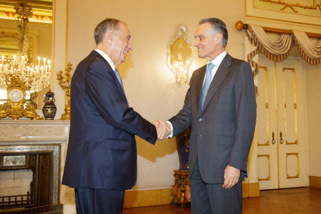
I am indeed pleased to attend the homage ceremony in honour of Vasco Graça Moura, timely promoted by the Calouste Gulbenkian Foundation.
The reasons for this tribute being paid are well known and have already been widely put forward, by several speakers, during this ceremony.
Vasco Graça Moura’s curriculum would anyway be sufficient for us to be aware that we are facing a foremost figure in Portuguese literary works and in our cultural life, but equally that of a first class author with a vast European following.
Vasco Graça Moura has in effect the rare quality of viewing Portugal through the eyes of an European, without losing his view of Europe as a Portuguese.
I will thus not deter myself on the excellence of his poetry, on the vastness of his culture or even on the versatility of an author who has published works in almost all the literary genres, and to whom have already been awarded so many national and international prizes.
I will not either recall the author of several notable texts on Camões and on other authors in our literature and arts.
Neither will I recall the translator that transformed into Portuguese some of the greatest figures in European culture.
His literary value is abundantly demonstrated by numerous specialists, whose knowledge and competence do not miss out on the dimension and greatness of his work.
Vasco Graça Moura will always be known, before anything else, as a virtuous man of literature, and it is his image as a writer, both for the erudite as well as for the general public, that will definitely command respect.
Allow me, however, to emphasise another feature of his biography which, although equally well known, runs the risk of becoming dimmed by the brilliance and deserved fame of the author.
I refer to the figure of the intellectual, of the driven citizen, who throughout the last decades so greatly contributed towards our democratic life, both in the performance of responsible duties, and in the continued intervention that he keeps up in the public domain.
Truthfully, and notwithstanding his projection as a man of letters, Vasco Graça Moura has maintained a major role for the consolidation, amongst us, of a society that holds dear the values of freedom and culture.
Reflecting on his actions in this field, we can associate him with past figures, such as Herculano and Garrett, to whom literary activity did not constitute an obstacle to political and civic intervention, with which they commenced the recovery of our heritage and set the dawn of a modern Portugal.
Similarly, and following on these major names in our history, Vasco Graça Moura has fulfilled several offices, in government and high level administration, always demonstrating a major sense of State and bringing great benefits for the Country.
His capabilities for leadership and drive are well known and have been proven in several institutions as already referred to here today.
From the National Press to the Committee for Discoveries and to the Committee for the Seville Universal Exhibition, from the European Parliament to the Belém Cultural Centre, through public television and the Calouste Gulbenkian Foundation – just to mention a few of the more prominent offices he has performed – his path has always left a trace of intelligence, dynamism and creativity.
Through his intervention and through the teams he knew how to set up and operate Portuguese culture achieved a different universal dimension. Classical works were re-edited and valuable pieces of our documentary heritage made widely known.
Incentive was provided to historical research and the literary and artistic creation.
In short, an image of Portugal was created that is mirrored in its eight centuries of history and that, simultaneously, continues asserting itself in the world of contemporary arts and sciences.
But the presence of Vasco Graça Moura in the public eye does not cease in this institutional component. On a par with the organizer, the citizen subsists, who is interested in public affairs and takes part in issues with which the community is faced.
For many years now that his word, often heated and polemic, is methodically made heard, bringing the vastness of his knowledge into public debate, together with the variety of his experience and the unmistakable virtuosity of his style.
Whether over matters of policy or matters concerning culture, his opinion is made heard, convinced and firm, especially when dealing with any cause with which he is particularly sensitive.
From this point of view, Vasco Graça Moura is an intellectual in the true meaning of the world, an author that, instead of hiding away in his ivory tower of artistic creativity, feels the need to come down to earth to comment on daily happenings and placing his opinion to the forefront.
I am certain that our democratic life, without his always clear and courageous participation, would be a lot less noble.
It is also due to all these reasons, and for all that has been stated here today, that Portugal should be grateful to him and the tribute we are now paying him is more than deserved.
I thus believe I interpret the wishes of the institutions and individualities that joined us in the celebration of Vasco Graça Moura’s work and his course, as well as that of his many readers and the Portuguese public in general that I decided to confer upon him the Grand Cross of the Order of Santiago da Espada.
© 2006-2016 Presidency of the Portuguese Republic
You have gained access to the records of the Official Site of the Presidency of the Republic from 9 March 2006 to 9 March 2016.
The contents available here were entered in the site during the 10 year period covering the two mandates of President of the Republic Aníbal Cavaco Silva.